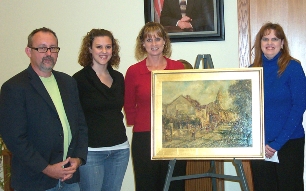When the Hallie Brown Ford Fine Arts Center opens soon at East Central University, two recent acquisitions will be on exhibit in the new art gallery -- valuable paintings by one of Latvia's most noted artists, Ludolfs Liberts.
The paintings were donated to ECU by Liberts' granddaughter, Melita Long of Ada, who works on campus for Chartwell's Dining Service.
One of the paintings she gave to ECU was painted in Germany of St. Mark's Square and the other appears to have been painted in Venice. Both are valued at approximately $10,000.
"They were just sitting in my house, so I talked to my mom before I did this and went from there. She was all for it," Long said.
Her mother, Jana Mitchell of Altus, was born in Riga, Latvia, to Liberts and his wife, Latvian opera singer Amanda Liberts Rebane. They all fled from Latvia during World War II.
"My mother-in-law and father-in-law went to school at ECU and I work here, so I decided it would be nice to donate the paintings and let the students enjoy them," Long said.
"I hear about people donating to ECU all the time," she added. "What better way to help young minds develop, and help different aspects of the art world? I am very proud to do this."
Liberts was known for painting landscapes and cityscapes, but he also was a stage designer. He designed 35 productions for the National Opera of Latvia, later named the Riga Opera Theatre.
Amanda Liberts Rebane performed the role of Carmen some 300 times, Long said.
Long never knew her grandfather, who died in 1959 in New York, but she has scoured the internet to learn more about him. A number of paintings can be viewed online, including a couple of his stage designs from operas in which her grandmother performed.
"He's more popular than I thought," she said. "He was very talented and very well known."
Jana Mitchell and her late husband, Charles W. Mitchell, donated one of her father's paintings some years ago to the Oklahoma City Museum of Art.
"It's nice to have all his paintings in your home," Mitchell said, "but only a small number of people see them. In a museum or art gallery, more people will see them. That's what my father believed, too. Besides enjoying painting them, he wanted other people to see and enjoy them."
Dr. Brad Jessop, chair of ECU's Department of Art, said he was amazed when Long offered to donate her paintings to the university.
"His (Liberts) name rang a bell but I was not familiar with him, Jessop said. "I did some research and thought, 'Oh my gosh.'
"If I hadn't had the experience before of bumping into people who had a good painting, I would have been more surprised," he added. "It's funny how life takes you on a certain journey and you end up in a certain place. I think it's great Melita did this."
Jessop said he came across a picture of President Eisenhower standing in the Oval Office with a Liberts painting on the wall behind him. The painting, "The Towers of Riga," was given to the White House in 1953 by the American Latvian Association.
Jessop also happened to see a television interview of P-Diddy, "and there was a Liberts behind him. They are very distinctive," Jessop said. "Apparently they are getting more popular."
Liberts used a heavy impasto approach, or thick layers of pigment, and the same methodology as impressionist painters, "but his are a little more expressive than impressive," Jessop said.
"These paintings have good provenance and are really indicative of his style. They'll hold their own."
Long also will loan some art books about her grandfather's work for the opening exhibition in the Hallie Brown Ford Fine Arts Center. They list museum collections with his work in Paris, Brussels, Moscow, Stockholm, Vienna, Helsinki, Oslo, Riga, Belfast, Dublin, London, Madrid and New York. Some of those museums were damaged or destroyed during World War II, however, and Long does not know the fate of those paintings.
Liberts was a prolific painter and had many paintings in his home, including the two that Long donated to ECU. His will stated that most of the paintings he owned would be sent back to Latvia after his death.
In 1944, Long's mother and grandparents "sneaked out of Latvia," Long said. "They wanted to give my mom a better life."
They were among many of the Latvian opera company's members who left their country and never returned after it was invaded by Russia in 1940 and occupied by German troops in 1941. Many changes had come to the opera company and some members were arrested or deported.
As a child, Mitchell said she knew her parents were important people, but that also had its drawbacks.
"I stayed with my grandparents, whom I loved, and had governesses, whom I hated. I wanted my parents," she said.
"I left the old country when I was 9," Mitchell said. "It was the last year of World War II. We had been bombed out and had slept under the stars. When you go through a war, you have a different kind of lifestyle, your outlook is different. You mature faster."
The Liberts family first went to Austria, then to Germany after the war ended. They were sponsored by American artist friends and came to the United States in 1950, settling in New York where Liberts continued to paint and taught at New York City College.
# # #

